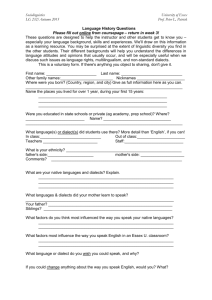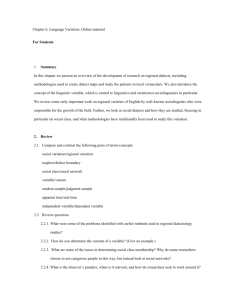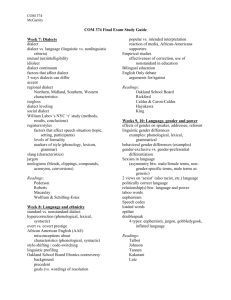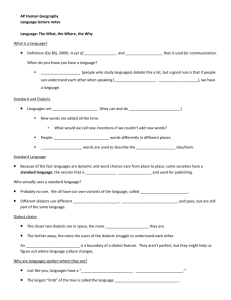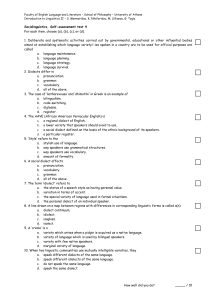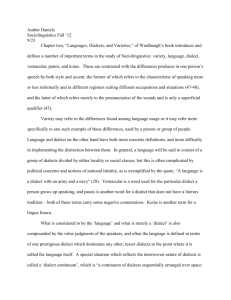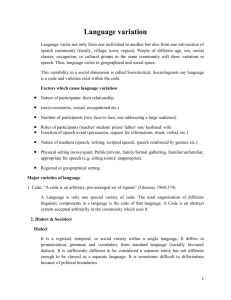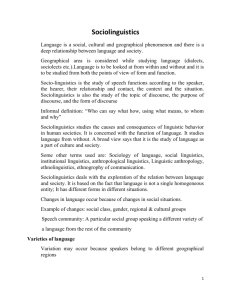Learning_Outcomes_files/Learning Outcome 2.doc
advertisement
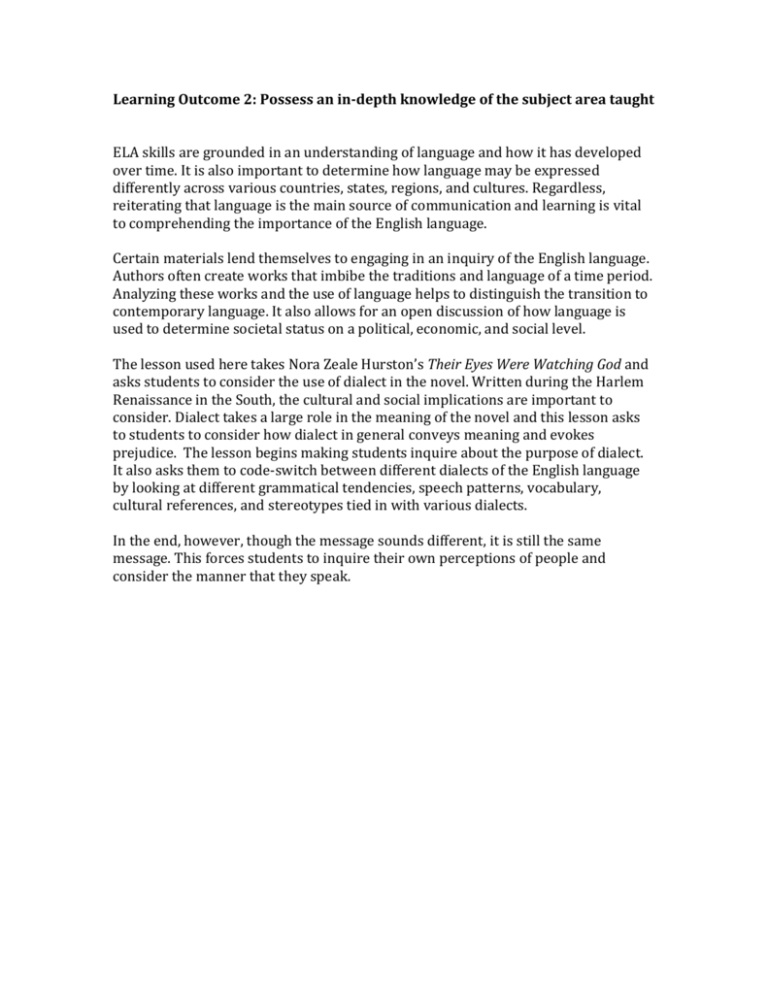
Learning Outcome 2: Possess an in-depth knowledge of the subject area taught ELA skills are grounded in an understanding of language and how it has developed over time. It is also important to determine how language may be expressed differently across various countries, states, regions, and cultures. Regardless, reiterating that language is the main source of communication and learning is vital to comprehending the importance of the English language. Certain materials lend themselves to engaging in an inquiry of the English language. Authors often create works that imbibe the traditions and language of a time period. Analyzing these works and the use of language helps to distinguish the transition to contemporary language. It also allows for an open discussion of how language is used to determine societal status on a political, economic, and social level. The lesson used here takes Nora Zeale Hurston’s Their Eyes Were Watching God and asks students to consider the use of dialect in the novel. Written during the Harlem Renaissance in the South, the cultural and social implications are important to consider. Dialect takes a large role in the meaning of the novel and this lesson asks to students to consider how dialect in general conveys meaning and evokes prejudice. The lesson begins making students inquire about the purpose of dialect. It also asks them to code-switch between different dialects of the English language by looking at different grammatical tendencies, speech patterns, vocabulary, cultural references, and stereotypes tied in with various dialects. In the end, however, though the message sounds different, it is still the same message. This forces students to inquire their own perceptions of people and consider the manner that they speak. Teacher: Samantha Slavin Class: English Date: 11/21/2012 Grade Level: 11 Room Number: 183 Period: 1,2,6,7 Unit: Their Eyes Were Watching God Topic: Dialect Context: The previous night, students were assigned Chapter 1 of Zora Neale Hurston’s Their Eyes Were Watching God. Students were asked to try to translate the southern dialect into Standard American English. Objectives: Short-range Learning Objective: • Students will be able to comprehend Zora Neale Hurston’s Their Eyes Were Watching God • Students will be able to define dialect • Students will be able to reconstruct a scene from Their Eyes Were Watching God using a different dialect Long-range Learning Objective: • Students will be able to demonstrate fluency in code-switching between Modern English and different dialects Guiding Questions: • How does the use of different dialects alter our perspective on society? • How does being aware of different dialects affect your perspective on the English Language? NYS Common Core Standards: Reading Standards for Literature Grades 11-12 • 11. Create interpretive and responsive texts to demonstrate knowledge and a sophisticated understanding of the connections between life and the literary work. a. Engage in using a wide range of prewriting strategies, such as visual representations and the creation of factual and interpretive questions, to express personal, social and cultural connections and insights. c. Develop innovative perspectives on texts, including historical, cultural, sociological, and psychological contexts. Language Standards Grades 11-12 Conventions of Standard English • Demonstrate command of the conventions of standard English grammar and usage when writing or speaking. a. Apply the understanding that usage is a matter of convention, can change over time, and is sometimes contested. Knowledge of Language • 3. Apply knowledge of language to understand how language functions in different contexts, to make effective choices for meaning or style, and to comprehend more fully when reading or listening. a. Vary syntax for effect, consulting references (e.g., Tufte’s Artful Sentences) for guidance as needed; apply an understanding of syntax to the study of complex texts when reading. Summary: Students will be introduced to the concept of dialect. We will discuss the stereotypes and prejudices associated with various dialects, and how it alters our view of people in society. Being aware of the many different dialects of the English language that are in existence, students will break up into small groups to brainstorm the many different types of dialects that they know. They will then work on writing a dialogue in that dialect. For homework they will translate a scene from Their Eyes Were Watching God into a dialect of their choice, providing a rationale for the changes they made. Procedure: Anticipatory Set: Begin the lesson by speaking to students with a Brooklyn dialect. Students will be confused by the use of a non-academic dialect in a classroom since they have always been taught in Standard American English. • • • Does anyone understand me? Am I speaking English? Is it considered proper? Why or Why not? Instruction: • Define Dialect: a variety of a language that is distinguished from other varieties of the same language by features of phonology, grammar, and vocabulary, and by its use by a group of speakers who are set off from other geographically or socially. Dialect can have words that are unique to itself and variant grammatical structures; Accents are variations in the way English is spoken • Name a few different dialects: Brooklyn Boston Jamaican Southern • What are some stereotypes associated with these dialects Why are they negative? Guided Practice: • Students will use their homework and translation of the dialogue from Their Eyes Were Watching God. Together we will go over how the Standard American English version together and discuss how it is different than the Southern dialect used, but in essence means the same thing. • We will then look at a translation that I have modeled which translates the scene into a UAM student dialect. We will look at the differences in speech patterns, vocabulary, cultural references, and stereotypes tied in with this dialect. • Students will split into small groups and brainstorm different dialects they could potentially write their own version of a scene in. They will then spend 5 minutes doing a free write of a dialogue in that dialect. Independent Practice: • For homework students will rewrite a scene from Chapter 2 in Their Eyes Were Watching God in a dialogue of their choice. They must provide a background of the dialect they chose and discuss the choices they made about when writing the translation. They must also write about how they believe an audience would receive this version instead of Hurston’s Assessment: Students will be assessed informally on their participation in class discussion and knowledge of the play. Their small group brainstorm and free write assignment will be assessed informally as well. This will be the scaffolding needed to perform the formal assessment assignment. Students will be assessed on their knowledge of dialect and how it functions formally. They will be assessed on a scale as such: Excellent Work - Acceptable Work - Satisfactory Work - Unsatisfactory Work On their: • • • Translation with Correctly Labeled Dialect Rationale for the Language Changes Made Inquiry into Audience Reception of Dialect
